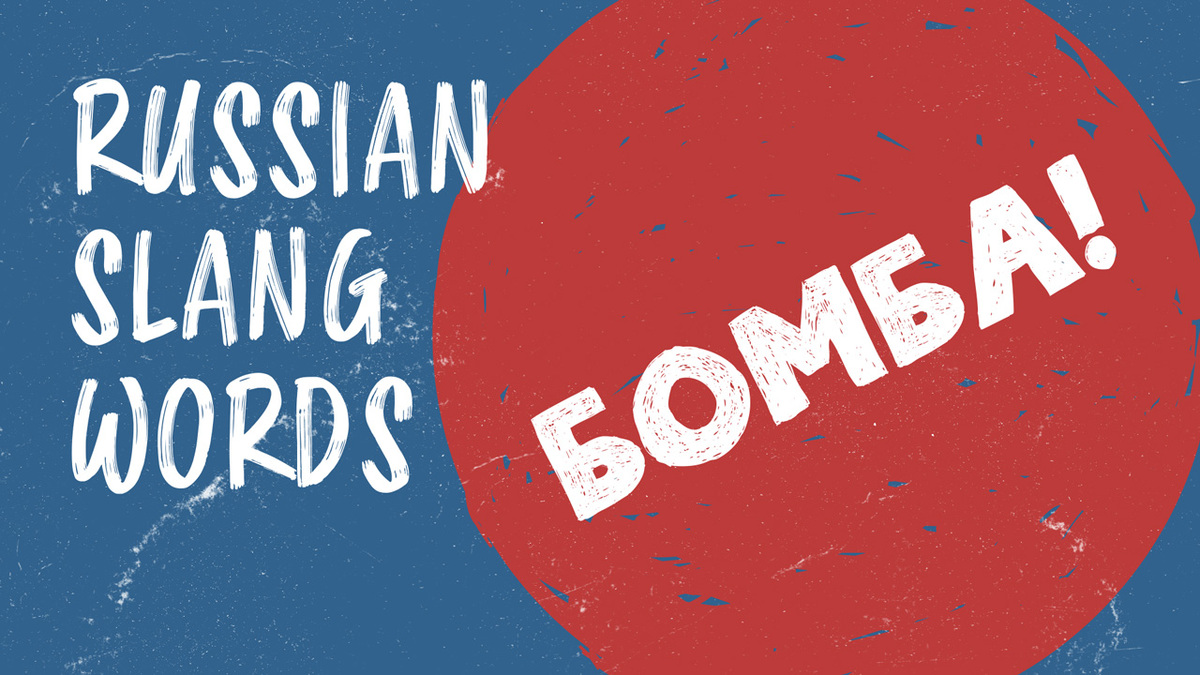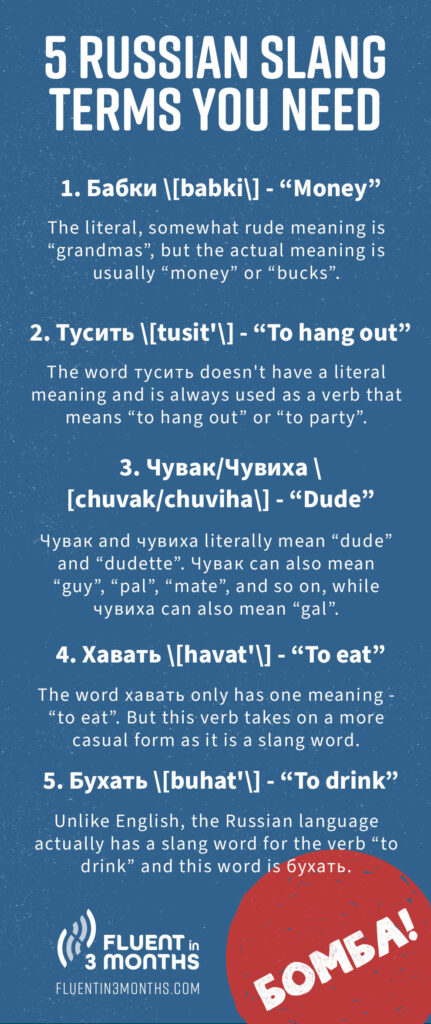20 Russian Slang Words To Help You Speak Like A Local
The Russian language has been called many things, including “difficult” and “mysterious”. Indeed, understanding the language Russians use in their daily life might be hard for someone who doesn’t know the multitude of slang words used in the language.
Table of contents
- 1. Бабки [babki] – “Money”
- 2. Тусить [tusit’] – “To hang out”
- 3. Чувак/Чувиха [chuvak/chuviha] – “Dude”
- 4. Чёрт [chiort] – “Devil”
- 5. Хавать [havat’] – “To eat”
- 6. Бухать [buhat’] – “To drink”
- 7. Грузить [gruzit’] – “To bore with too much talking”
- 8. Бомба [bomba] – “Amazing”
- 9. Достал/Достала [dostal/dostala] – “To be annoyed”
- 10. Всё ништяк. [Vsio nishtiak.] – “It’s all good.”
- 11. Мне до лампочки. [Mne do lampochki.] – “I don’t care.”
- 12. Мне фиолетово. [Mne fioletovo.] – “I don’t care.”
- 13. Офигеть! [Ofiget’!] – “Wow!”
- 14. Кайфонуть [Kayfonut’] – “To have a pleasant pastime”
- 15. Давай побазарим! [Davay pobazarim!] – “Let’s have a chat.”
- 16. Да не гони! [Da ne goni!] – “Seriously?”\
- 17. Да ну нафиг! [Da nu nafig!] – “ I don’t want it.”
- 18. Нифига себе! [Nifiga sebe!] \ – “Wow!”
- 19. Это полный зашквар! [Ato polnyi zashkvar!] – “This is too much.”
- 20. Ты спалился! [Ty spalilsia!] \ – “You got spotted!”
- Final Thoughts on Russian Slang
Here are the twenty frequently used Russian slang words to get you started:
1. Бабки [babki] – “Money”
The literal, somewhat rude meaning is “grandmas”, but the actual meaning is usually “money” or “bucks”. Here’s an example:
Бабки есть? [Babki yest’?] – “Got some money?”
This word is mostly used in casual talk, so you will never hear it from someone speaking in an official manner. In fact, the word бабки is also used by criminals both large and small.
If you watch some modern Russian movies or TV shows, you will notice that the majority of law-breakers use this word for money rather than using the usual деньги [den’gi] .
2. Тусить [tusit’] – “To hang out”
The word тусить doesn’t have a literal meaning and is always used as a verb that means “to hang out” or “to party”.
Мы тусим. [My tusim] – “We’re hanging out.”
Most Russians love hanging out with their friends or family. The word тусить can be used in almost any situation to describe the action of hanging out with other people, but you should still keep in mind that it’s a slang word.
3. Чувак/Чувиха [chuvak/chuviha] – “Dude”
Чувак and чувиха literally mean “dude” and “dudette”. Чувак can also mean “guy”, “pal”, “mate”, and so on, while чувиха can also mean “gal”.
Чувак со мной работает. [Chuvak so mnoy rabotaet.] – “The guy works with me.”
The feminine version of the word dates back to the 1920s, but during that time, it meant “prostitute”. It went more mainstream during the 1960s and has since become a common slang word along with its masculine counterpart.
4. Чёрт [chiort] – “Devil”
The literal meaning of чёрт is “devil”, but it is more commonly used as an exclamation similar to “Shoot!” or “Damn!”
Чёрт, я забыла об этом. [Chiort, ya zabyla ob atom.] – “Shoot, I forgot about it.”
The word чёрт is used both by young and old alike. It is not a swear word, so you will hear people often exclaiming that just like English speakers use “damn” or “shoot” in unfortunate situations.
5. Хавать [havat’] – “To eat”
The word хавать only has one meaning – “to eat”. But this verb takes on a more casual form as it is a slang word.
Идём хавать. [Idiom havat’.] – “Let’s go eat.”
There are many synonyms in the English language that mean the same thing – “to eat”. They include grub, pig out, chow down, and others. As long as it’s a casual word or phrase for eating, its equivalent will probably be хавать in Russian.
6. Бухать [buhat’] – “To drink”
Unlike English, the Russian language actually has a slang word for the verb “to drink” and this word is бухать.
Пошли бухнём. [Poshli buhniom.] – “Let’s go drink.”
There are some other variations that have the same base including бухой [buhoy] (“drunk”) and набухаться [nabuhatsa] (“to get drunk”).
7. Грузить [gruzit’] – “To bore with too much talking”
Literally, it means “to load”, but as a slang word, грузить means “to overload mentally”, “to bore with too much talking” or “to confuse”.
Хватит меня грузить! [Hvatit menia gruzit’!] – “Stop overloading me!”
When someone keeps boring you with their long and endless story or tries to load you with their troubles, you can always use the word грузить to express how you feel and ask them to stop.
8. Бомба [bomba] – “Amazing”
This word is very similar to the English word “bomb” and they actually have the same meaning.
However, бомба also means “the bomb” or “amazing” when used casually.
Это место просто бомба! [Ato mesto prosto bomba!] – “This place is the bomb!”
More often than not, using this word to show your awe of something will express your feelings quite well as it is best applied in situations when you’ve been blown away (in a good sense). By the way, did you know that Russian is one of the most popular, Бомба languages in the world?
9. Достал/Достала [dostal/dostala] – “To be annoyed”
The literal meaning of this verb is “to reach over and get”, but the slang form is just as common and means “to be annoyed”.
Ты меня достал! [Ty menia dostal!] – “You’ve annoyed me!”
By using this verb, you can show that someone has annoyed or irritated you quite a bit.
10. Всё ништяк. [Vsio nishtiak.] – “It’s all good.”
“When I went to Russia, I couldn’t understand what this phrase meant at first. But once they explained it to me, I started using it more often in my daily conversations. “It’s a really fun phrase,” says Neightan White, travel blogger from IsAccurate.
The phrase всё ништяк is the equivalent of the phrase “it’s all good”, but the Russian version has a more casual tone to it.
Я разобрался. Всё ништяк. [Ya razobralsia. Vsio nishtiak.] – “I’ve figured it out. It’s all good.”
Use this phrase to show that everything is fine and you are feeling good.
11. Мне до лампочки. [Mne do lampochki.] – “I don’t care.”
If you take it literally, it won’t make any sense as it means “to me to the lightbulb”. But this phrase actually means “I don’t care”.
Мне до лампочки, придёт он или нет. [Mne do lampochki, pridiot on ili net.] – “I don’t care whether he comes or not.”
You could say that this is a very expressive way to show your indifference to something.
12. Мне фиолетово. [Mne fioletovo.] – “I don’t care.”
This phrase is very similar to the previous one and actually has the same meaning.
Да мне фиолетово вообще. [Da mne fioletovo voobshe.] – “I don’t really care.”
You can use this phrase and мне до лампочки interchangeably.
13. Офигеть! [Ofiget’!] – “Wow!”
There is no literal meaning for this word, but it means something along the lines of “wow” or “I can’t believe it”.
Офигеть! Никогда не ожидала. [Ofiget’! Nikogda ne ozhidala.] – “Wow! I never expected that.”
There is a Russian word фига [figa] that originated from a similar word in German and was the equivalent of the English F-word. Офигеть is just one of the many words that spawned from the word фига and are now widely used all across Russia and some other neighboring countries.
14. Кайфонуть [Kayfonut’] – “To have a pleasant pastime”
This verb originates from the word кайф [kayf] which is a slang term for “pleasure”. Consequently, кайфонуть means “to have a pleasant pastime”.
Я кайфонул. [Ya kayfonul.] – “I had a nice time.” or “I enjoyed myself.”
Originally, this word was used to describe the state one experiences being on drugs, but then its meaning transformed into a more acceptable one. You can use it for anything from enjoying chocolate to having a good time hiking. Try using it during a language exchange.
15. Давай побазарим! [Davay pobazarim!] – “Let’s have a chat.”
Literally, you could say this means “let’s do marketing”. However, the actual meaning is something along the lines of “let’s have a chat”.
Давай выйдем, побазарим. [Davay vyidem, pobazarim.] – “ Let’s go out, have a chat.”
More often than not, you will hear this phrase used by criminals, though normal casual chats may also have it here and there.
16. Да не гони! [Da ne goni!] – “Seriously?”\
You would think that this phrase means “don’t go/drive fast”, but it actually has four other meanings similar to each other.
Да не гони! Серьёзно? [Da ne goni! Seryozno?]\ – “I can’t believe you! Seriously?”
The meanings vary from “you are saying something unreal” and “I don’t/can’t believe you” to “you are saying something I believe is not true” and “stop lying”.
17. Да ну нафиг! [Da nu nafig!] – “ I don’t want it.”
As you may have noticed, this is one of the variations with the word фига. The phrase means “I don’t want it” or “‘eff it”.
Да ну нафиг! Не буду я это делать! [Da nu nafig! Ne budu ya ato delat’!] – ”’Eff it! I won’t do it!”
You could also extend the meaning to “‘eff it, I don’t want to deal with it”.
18. Нифига себе! [Nifiga sebe!]\ – “Wow!”
Yet another useful variation of the aforementioned word, нифига себе is actually quite similar to офигеть and means is used to show your “wow” reaction to something.
_Нифига себе! Он это реально сделал! [Nifiga sebe! On ato real’no sdelal!] – “Wow! He really did it!”
You can use this phrase every time you are awed or surprised by something, but if you are looking for a less striking phrase, ничего себе [nichevo sebe]_ is a nice alternative.
19. Это полный зашквар! [Ato polnyi zashkvar!] – “This is too much.”
This phrase could be used both for saying “this is too much” and for saying “this is insane”. However, the first definition is more widespread.
Это полный зашквар! Я не знаю, что делать. [Ato polnyi zashkvar! Ya ne znayu shot delat’.] – “This is too much! I don’t know what to do.”
You can also say it to somebody who did something insane, overdone, or complicated.
20. Ты спалился! [Ty spalilsia!]\ – “You got spotted!”
The last word on our list literally means “you burned yourself”, but that’s actually not what it is used for. Ты спалился is the equivalent of “you’ve been busted” or “you got spotted”.
Ты спалился на экзамене. [Ty spalilsia na ekzamene.] – “You were busted on the exam.”
More often than not, you will use it to say that you saw someone or another person saw someone doing something they weren’t supposed to be doing (like watching movies when you should be studying for the exam).
Final Thoughts on Russian Slang
All in all, using Russian slang words will not only allow you to sound more natural but will also help you understand songs, movies, and other types of entertainment. This is definitely not a complete list of all the Russian slang words you may encounter while having conversations with Russians, but these twenty are the most commonly used ones and you can start learning them first.
Original article by Kristin Savage, updated by the Fluent in 3 Months team.
If you need additional motivation, check out this Language Hacking podcast episode:




Social